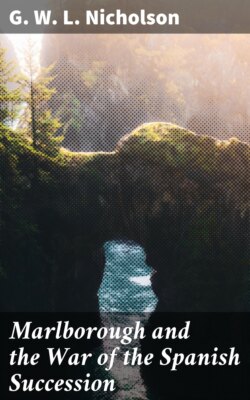Читать книгу Marlborough and the War of the Spanish Succession - G. W. L. Nicholson - Страница 4
На сайте Литреса книга снята с продажи.
The Background to the War
ОглавлениеTable of Contents
As to the Duke of Marlborough . . . it was allowed by all men, nay even by France itself, that he was more than a match for all the generals of that nation. This he made appear beyond contradiction in the ten campaigns he made against them; during all which time it cannot be said that he ever slipped an opportunity of fighting when there was any probability of his coming at his enemy. And upon all occasions he concerted matters with so much judgment and forecast that he never fought a battle which he did not gain, nor laid siege to a town which he did not take.
Thus recorded in his diary[1] Captain Robert Parker, whose regiment, the 18th Foot (Royal Irish), fought under Marlborough in the War of the Spanish Succession and contributed in no small way to the high reputation with which the British Army emerged from that conflict. So enthusiastic an estimate might well be discounted as coming from one who served with the Duke and whose judgment might tend to be unduly influenced by his great personal charm and the blaze of fame which surrounded him while he lived. But other critics with no grounds for personal bias have been just as generous; indeed Marlborough's military stature has grown with the passage of time. A century later one of Napoleon's ablest officers, General Foy, could find no higher praise for the brilliant generalship displayed by the Duke of Wellington at the battle of Salamanca than to place the Iron Duke "almost on the level of Marlborough". Napoleon himself regarded Marlborough's campaigns as a model; he read and re-read them many times, and appears to have accorded the English general a higher place than the great Frederick of Prussia. Modern military historians are unanimous in placing Marlborough in the forefront of the great soldiers of all time. "If there had been no Marlborough," writes one of them,[2] "England would have sunk into a mere province of France, and the United States would have been French, not English.... Centuries hence, when historians write their account of an England which has become a mere name and of an Europe which has passed away, they will be silent about many men who are now reckoned great, but they will not pass over Marlborough."
The War of the Spanish Succession has been called "the most businesslike" of all wars in which British forces have been engaged. The investment of a comparatively small number of troops brought Britain rich returns. By the end of the war she had acquired valuable territorial assets (including her first permanent Mediterranean naval base) and had replaced France as the leading state in Europe—and hence in the world. That a limited expenditure for men and materials could achieve such results must be credited in no small degree to the masterly guidance of the Duke of Marlborough. While he is remembered chiefly for the brilliant Continental victories which demonstrated his skill as tactician (and it is primarily with these battles that this study is concerned), these could not have crushed the power of France had it not been for his genius in the field of grand strategy, in which he was so ably served by his talents as statesman and diplomat.
